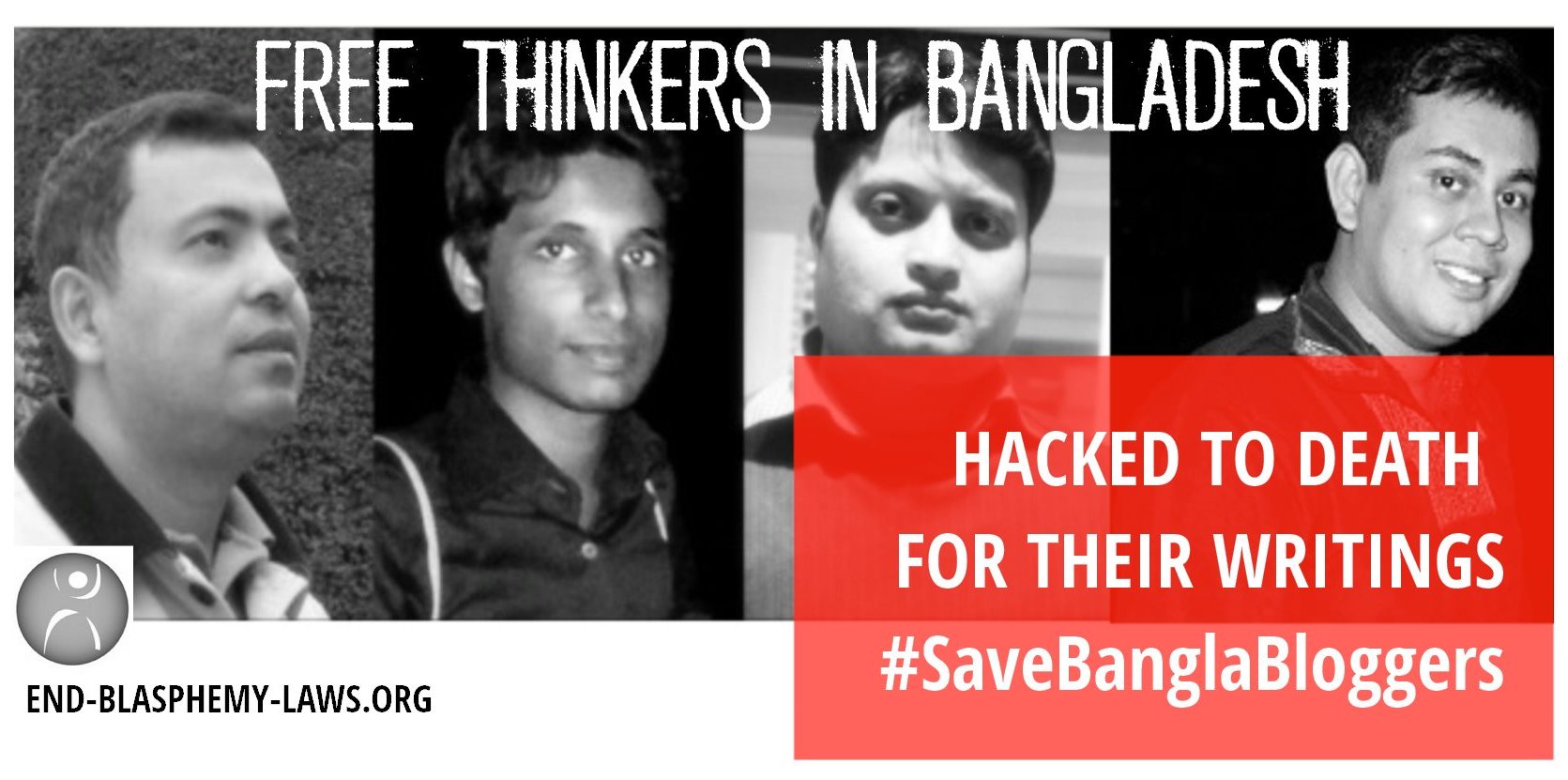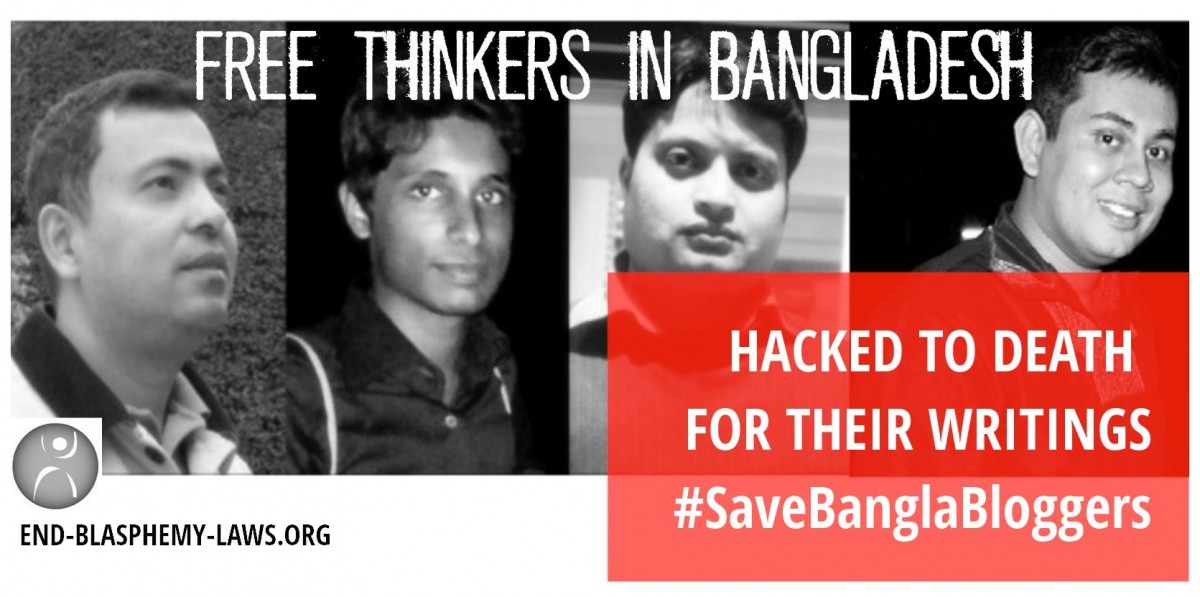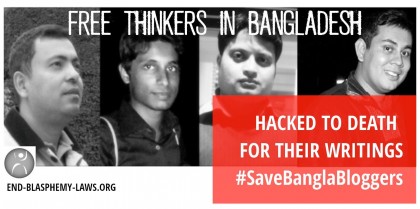

Published on 23 June 2015 in Uncategorized
Speak Out for Bangladesh Bloggers
Violations of the right to freedom of religion or belief and freedom of speech have dramatically increased over the past few years in Bangladesh. This year, four secular and humanist bloggers were hacked to death, apparently for “insulting Islam”. Niladri Chatterjee (Niloy Neel), Ananta Bijoy Das, Md Washiqur Rahman Babu and Avijit Roy were murdered on 7 August, 12 May, 30 March and 27 February 2015 respectively, by Islamist radicals.

“No one with a free mind can limit themselves within the walls of narrow-mindedness” (Ananta Bijoy Das)
Their crime? Promoting humanism and secularism, voicing skeptical and rationalist arguments, peacefully calling for justice and freedoms in Bangladesh.
These four murders follow a succession of attacks and “blasphemy”-type prosecutions over several years against those who identify as non-religious or humanist, or those who seek to criticize political Islam in Bangladesh. For instance:
- On 25 November 2014, Islamists hacked to death Professor Shafiul Islam, several years after he led a push to ban students wearing full-face veils.
- On 31 March 2014, teenage bloggers Kazi Mahbubur Rahman Raihan and Ullash Das were sent to jail for posting Facebook comments that were considered “insulting” to Islam and the Prophet. This was after they had been attacked and beaten by a mob.
- On 15 February 2013, blogger, architect and activist Ahmed Rajeeb Haider was hacked to death a day after he took part in a Shahbag rally.
- Asif Mohiuddin was stabbed in January 2013 and survived that attack, only to be arrested on 3 April of the same year, along with three other bloggers whose arrest had been demanded by Islamist parties, and all four were charged with “offending Islam and its Prophet”
- Subrata Adhikari Shuvo, Mashiur Rahman Biplob, and Rasel Parvez were also arrested for “hurting religious sentiments” in 2013.
The latest killings follow the same pattern: the victims, all people who have sought to critique Islamism, political Islam or express skepticism about religious viewpoints, were targeted and hacked to death with machetes or similar weapons. These assassinations have been claimed by Islamist group Ansarullah Bangla Team – a group that has since been banned by the Government. The banning of Ansarullah Bangla Team is neither enough to ensure physical protection of freethinker writers, nor is it sufficient to protect free speech and freedom of belief in Bangladesh.
Freethinkers Unprotected
In April 2013, a rally of approximately 100,000 Islamists marched in Dhaka (video) calling for a new blasphemy law and for the execution of atheist bloggers. This demonstration was organised after freethinker bloggers started a popular movement known as the Shahbag Movement/Protest demanding justice for crimes against humanity committed during the 1971 Bangladeshi Liberation War, in which Jamaat-e-Islam and its leaders were strongly implicated.
De facto blasphemy law already in place
In response, hardline Islamist groups provided the government with a list of 84 “atheist bloggers” and asked for the death penalty under a new blasphemy law for those who “insult religion.” Prime Minister Sheikh Hasina said rejected the calls from Islamists to implement an anti-blasphemy law, but only because she argued that existing laws against offending religious sensibilities were already sufficient to punish anyone who attempted to insult religion. She said her government would take action against anyone defaming Islam. Soon thereafter, several bloggers were arrested, the authorities shut down their websites and blogs and pledged to investigate others on the “lists” provided by Islamist parties (for more information, see the IHEU’s story on the issue). Under the existing cyber laws in Bangladesh, a person can be jailed for up to 10 years if convicted of defaming a religion online.
The existence of “blasphemy”-like legal restrictions is being used to harass and curtail the freedom of expression of the very people being targeted with violence and assassination by Islamist aggressors.
Bangladesh is a signatory of the International Covenant on Civil and Political Rights (ICCPR), according to which it has a legal duty to protect the right to freedom of religion or belief (Article 18) and freedom of expression (Article 19) of its citizens. It is patently failing to do so.
This issue is not only about protecting the right to freedom of belief and expression for all; it is also about helping those facing imminent threat and protecting those people brave enough to speak out against religious extremism and militancy in the country.
Notably, a few days before he was assassinated, Ananta Bijoy Das was denied a visa by Sweden to speak at a conference on press freedom on the grounds that he “might not come back to Bangladesh” and that his case was “not urgent enough” (Read article from Washington Post).
♦ TAKE ACTION ♦
There is an urgent need to raise awareness of this issue and to call on the government of Bangladesh to guarantee the safety of its atheist bloggers, to respect the human right to freedom of expression and freedom of religion or belief, and to prosecute those who threaten, attack and harm bloggers who simply seek to exercise such a right.
1. Express your solidarity online
#SaveBanglaBloggers
In 2013, when atheist bloggers got arrested by the police, the Twitter hashtag #HumanistSolidarity was also used in connection with the Bangladeshi bloggers.
Feel free to use our visuals
2. Pressure the Bangladesh government
You can contact your own Foreign Affairs Ministry or your Government’s embassy in Bangladesh. The list is of embassies is available here: http://www.bangladesh.com/embassies/
Urge your government to put pressure on Bangladesh to:
- Act urgently to bring to justice those responsible for attacks against atheist bloggers.
- Do all in its power to stop the violent campaign against those who profess no religion, criticise Islamism, political Islam, or religious views.
- Make a clear and public statement clarifying that the right to freedom of religion or belief applies to those with no religious belief as well;.
- Amend legislation, specifically the Penal Code, Code of Criminal Procedure and the Information Communications Technology Act 2006, so as to bring it in to line with international human rights standards.
- Ensure that law enforcement agencies uphold the right to freedom of expression, and provide training to those agencies on how to deal with crimes against those seeking to exercise free expression.
If a national embassy were to receive even a small number of letters on this issue, this could help encourage them to raise it as a priority with the government of Bangladesh.
3. Raise the issue with the European Union
In 2013, the EU adopted new Guidelines to protect the right to freedom of religion or belief (FoRB) so as to help its delegations deal with the issue abroad. As the Co-President of the European Parliament Intergroup on FoRB & Religious Tolerance admitted:
“Despite the adoption of the EU-Guidelines on the protection of FoRB, it still depends very much on the individual priorities of embassies and delegations whether the EU and its Member States raise the issue of freedom of religion or belief with third countries and take appropriate action”.
(Read here)
After three murders in three months, it is clear that the EU delegation in Bangladesh, in accordance with its external guidelines, must act by increasing pressure on the government of Bangladesh to do more to protect the rights of atheist / secular bloggers in the country both through the reforming of legislation and bringing to justice those respsonsible for commiting atrocities against the bloggers in the first place .
- European External Action Service
Federica Mogherini, High Representative for Foreign Affairs and Security Policy and Vice-President of the European Commission: federica.mogherini@ec.europa.eu | @FedericaMog
Delegation of the EU to Bangladesh, Ambassador & the Head of Delegation : Mr Pierre Mayaudon | delegation-bangladesh@eeas.europa.eu
- European Parliament
Martin Schulz, President of the European Parliament | martin.schulz@europarl.europa.eu | @MartinSchulz
Antonio Tajani, Vice President of the European Parliament | antonio.tajani@europarl.europa.eu | @Antonio_Tajani
European Parliament Intergroup on Freedom of Religion or Belief and Religious Tolerance : Mrs Marina Zaitsava & Mr Alfiaz Vaiya (Secretariat) m.zaitsava@religiousfreedom.eu | a.vaiya@religiousfreedom.eu
- Council of the European Union
Donald Tusk, president |president@consilium.europa.eu | @eucopresident
Riina Kionka, Chief Foreign Policy Advisor, Cabinet Donald Tusk | riina.kionka@consilium.europa.eu
- European Commission
Jean-Claude Juncker, President: jean-claude.juncker@ec.europa.eu | @JunckerEU
In your correspondence, we suggest you:
- Remind decision-makers of the facts (see our briefing Briefing focus Bangladesh).
- Highlight the fact that freethinker bloggers are being persecuted, blacklisted and murdered by Islamist groups because of their atheism, humanism and for their alleged “insults to religion.”
- Underline the fact that the right to freedom of religion or belief includes the freedom not to believe and to change one’s belief. This is a right recognised by international law; notably the ICCPR of which Bangladesh is a signatory.
- Insist that criticising religion as such, or holding to account specific religious authorities in particular, is not automatically hateful and should be protected; this is essential to maintaining a secular state and respecting international human rights standards.
- Recognize that Bangladesh’s Government has banned the islamist group which claimed responsibility for the murders of Ananta Bijoy, Md Washiqur Rahman Babu and Avijit Roy but that this is far from sufficient to ensure the security and protection of writers and bloggers who are on the “hit-list”.
- Request that EU Institutions: strongly condemn these murders; call for the removal of any provision condemning “insult to religion” in Bangladesh’s legislation (more details here); and take concrete actions to protect the safety of freethinkers, including via the facilitation of visas and asylum status.
Bangladesh, blasphemy laws, and further reading
- For the full country report from the End Blasphemy Laws campaign, see our Bangladesh page.
- For further issues around human rights and the non-religious in Bangladesh see the Freedom of Thought Report country entry on Bangladesh.
- or wider issues on freedom of religion or belief in Bangladesh see: US Commission on International Religious Freedom 2015 report (p 193- 194).


